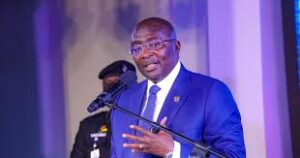Charlotte Osei Urges Leaders to Emulate Atta Mills’s Selfless Leadership at 13th Memorial Lecture

At the 13th John Evans Atta Mills Commemorative Lecture held at the University of Professional Studies, Accra (UPSA), former Electoral Commission Chairperson Charlotte Osei issued a strong appeal to Ghana’s political class: adopt the leadership style of the late President Mills—defined by humility, principle, and a genuine commitment to national service.
Delivering the keynote address, Mrs. Osei emphasized that the current political landscape would benefit greatly from leaders who lead with empathy, ethics, and a deep sense of public duty, just as President Mills did throughout his career in public life.
“Ghana needs leaders who embody humility, not as weakness, but as controlled strength,” she said. “President Mills knew his worth, but never allowed it to overshadow his humanity. That is the kind of leadership this country is desperately missing.”
Held under the theme “Atta Mills: The Man, The Teacher, The President,” the event attracted dignitaries from across the political and civic spectrum. Notable figures included Vice-President Professor Naana Jane Opoku-Agyemang, Speaker of Parliament Alban Bagbin, Chief of Staff Julius Debrah, NDC Chairman Johnson Asiedu Nketiah, and General Secretary Fifi Kwetey. Ministers of state, family members of the late President, and numerous former colleagues were also present.
Reflecting on her personal journey, Mrs. Osei recounted that she was once a student of Prof. Mills at the University of Ghana, and later served as Chairperson of the National Commission for Civic Education during his administration. These experiences, she said, gave her a front-row view of his ethical and inclusive leadership style.
“He was a leader who refused to compromise his values, even when it was politically inconvenient,” she said. “He proved that political power can be exercised with moral clarity.”
Mrs. Osei recalled a poignant memory when, after a disagreement, President Mills sent her a message months later, admitting he had been wrong. “That moment stayed with me. It showed me the character of a leader who saw no shame in admitting his mistakes. It was a rare display of emotional intelligence and humility,” she noted.
She also praised Mills’s commitment to nurturing young talent and promoting women into leadership. Under his presidency, she said, many of today’s prominent national leaders—including Defence Minister Dr. Edward Omane Boamah and MP Samuel Okudzeto Ablakwa—were given significant responsibilities early in their careers.
“Prof. Mills believed in building future leaders. He didn’t just talk about youth empowerment—he practiced it,” she said. “He gave people space to grow, make mistakes, and lead.”
Mrs. Osei further pointed to the international respect Mills earned for his integrity and fairness. She cited recent remarks from Nigeria’s President Bola Ahmed Tinubu, who praised Mills’s commitment to high ethical standards in both his public and private life—a legacy many feel is missing in today’s leadership.
Chief of Staff Julius Debrah, who chaired the event, also spoke about Mills’s historical significance, describing him as a transitional figure between Ghana’s past and future.
“He was a bridge between military-era governance and modern democracy. His calm temperament, commitment to peace, and resistance to political vindictiveness made him a statesman in every sense,” Debrah said.
He argued that the late President’s approach to leadership, rooted in tolerance and accountability, was especially relevant in an era of growing political polarisation and public mistrust.
“Prof. Mills was a gift to Ghana’s Fourth Republic. He stood for decency in politics, and his legacy should guide how we govern today,” he concluded.
As the nation reflects on the values and vision of the late president, Charlotte Osei’s call to action remains clear: if Ghana is to move forward, its leaders must choose humility over ego, principle over partisanship, and service over self-interest—just as Atta Mills did.






